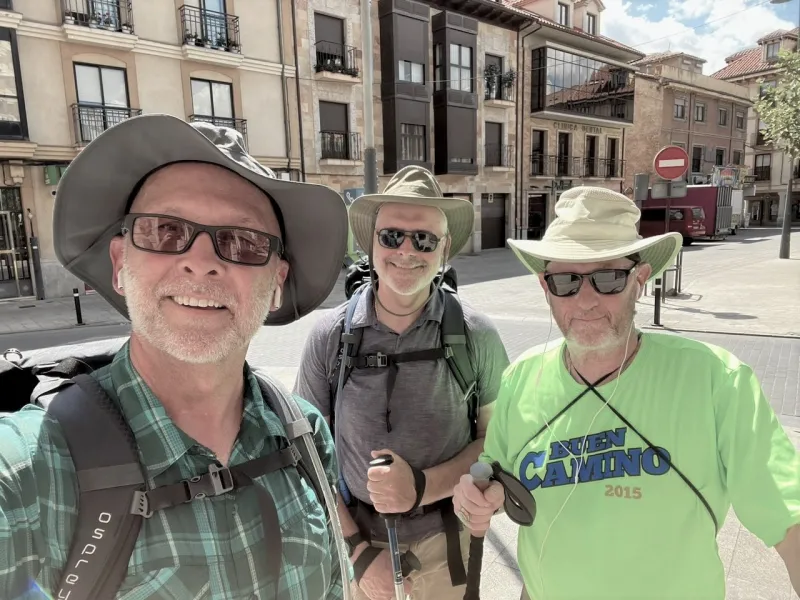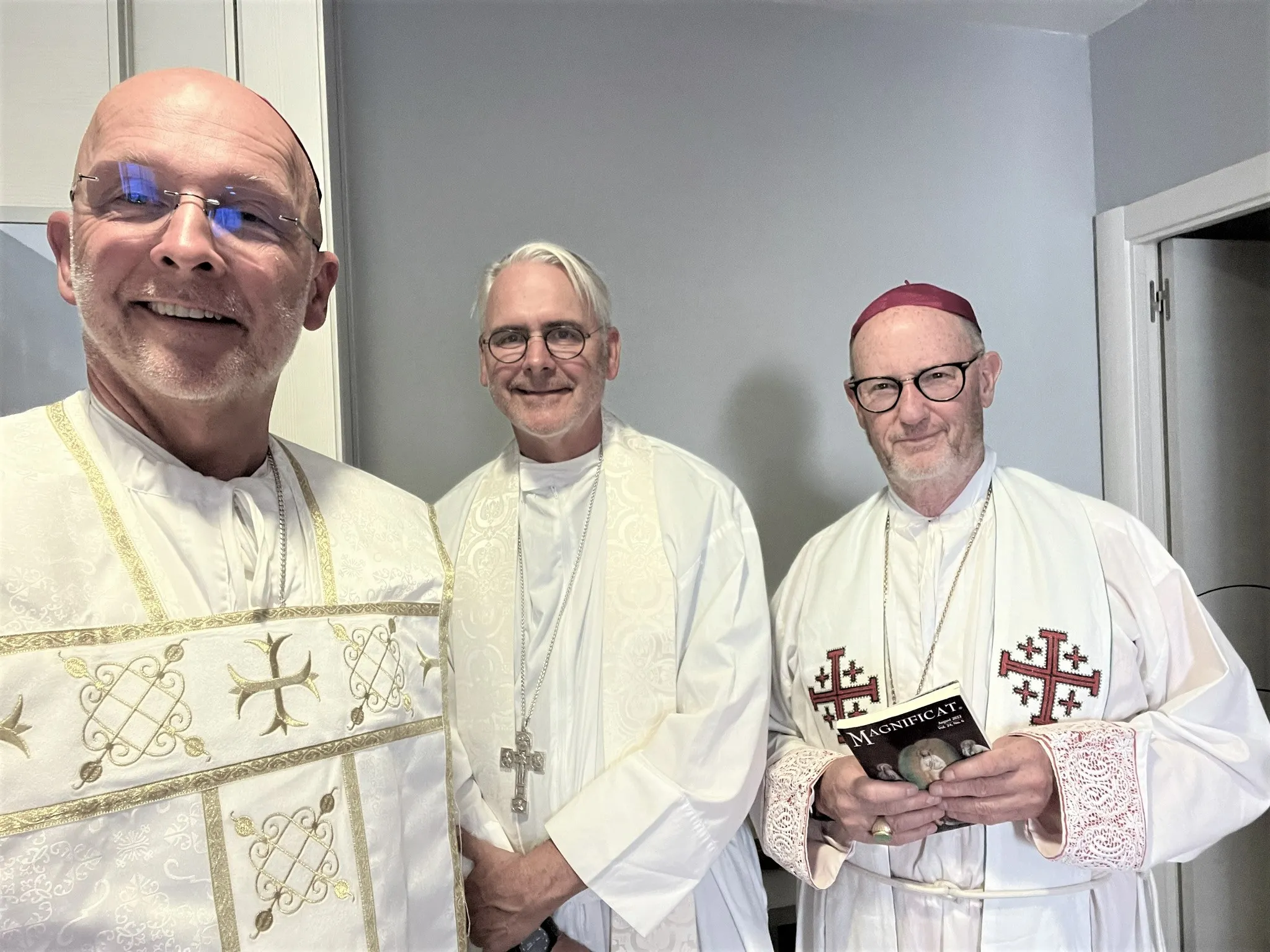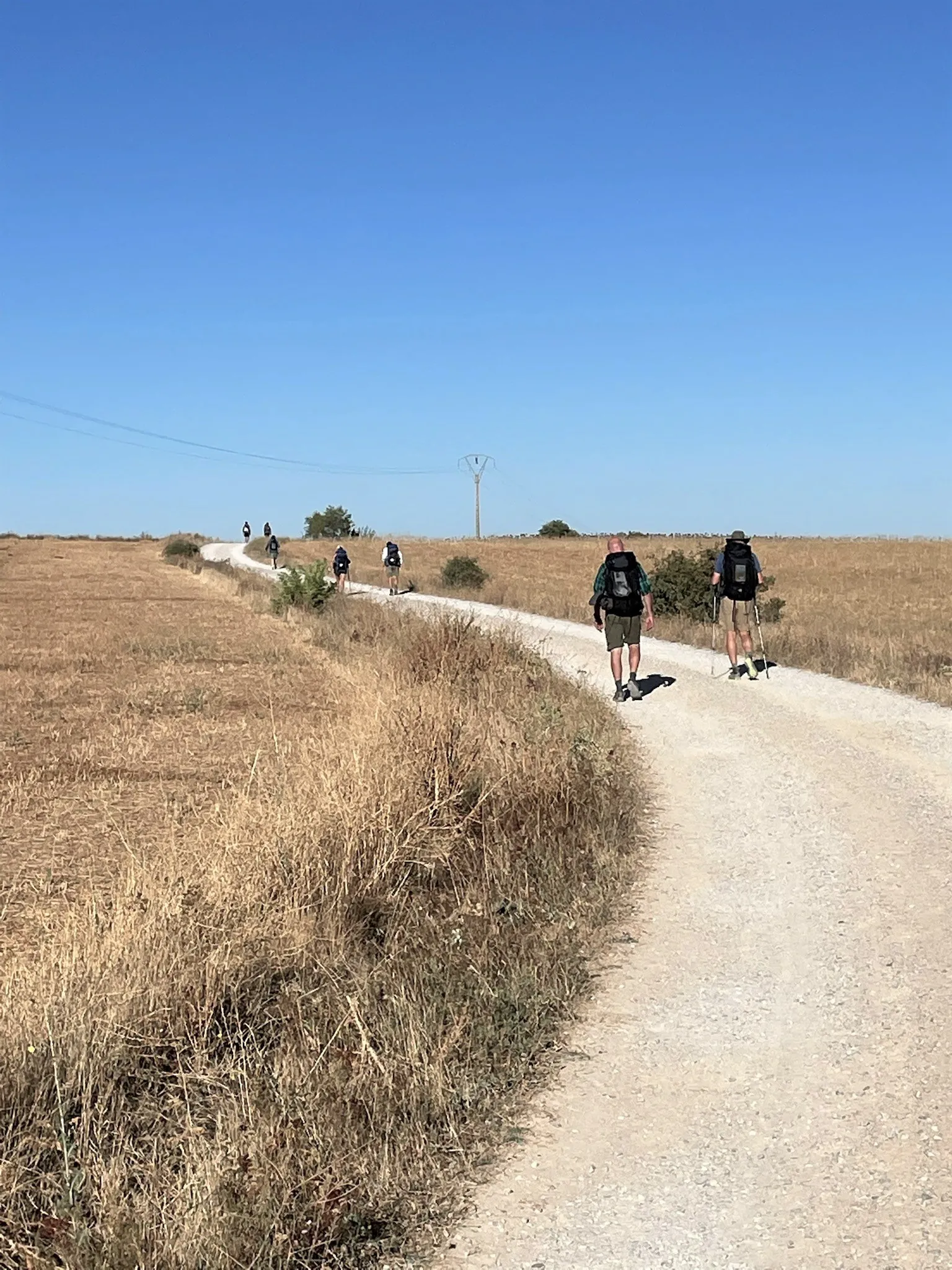
Washington D.C., Sep 11, 2022 / 06:38 am (CNA).
When three American bishops from the United States set out this August to walk the Camino de Santiago de Compostela in northwestern Spain together, they knew to pack only the most necessary gear in their backpacks to keep their load as light as possible for the 200-mile pilgrimage.
For these old friends, who had made the Camino together twice before, there were a few items that were absolutely essential to bring along.
Along with the long-distance hiker’s necessities, Bishop James Conley, 67, of Lincoln, Nebraska; Archbishop Paul Coakley, 67, of Oklahoma City; and Bishop James Wall, 57, of Gallup, New Mexico, carried a “simple Mass kit,” Conley told CNA in an interview.
Every evening at 7 p.m., Conley explained, there is a pilgrims’ Mass in each village along the Camino. The priests accompanying groups of pilgrims are always invited to celebrate the Mass.
Their packing list included: a golden chalice and paten; two linens, the corporal and the purificator; and two plastic bottles for water and wine. Each bishop also had his own white alb, a lightweight traveling chasuble, a stole, and the purple zucchetto and pectoral cross worn by bishops.
The three walked 15 to 24 miles a day along the Camino, just as pilgrims have been doing for more than 1,000 years, praying and talking with the people they met. Dressed in the modern pilgrim’s uniform of tech shorts, hiking shoes, titanium walking sticks, sunglasses, and hats, they blended in with their fellow peregrinos.
Conley, who was walking the Camino for the third time, said they sometimes surprised people at the evening pilgrims’ Mass.
“We didn’t hide the fact that we were bishops, but we’d be walking with a group of people talking and whatever. And then that evening at the pilgrims’ Mass we would vest up for that Mass, and then people we were walking with would say, ‘Gosh, those are bishops!’” Conley told CNA.
“Sometimes it’s kind of surprising for some of them. It was kind of funny, because they thought that was really cool,” he said.

Conley brought a particular intention with him on the Camino. In 2018, he began to suffer from anxiety and depression and took an 11-month sabbatical when it became impossible for him to fulfill his duties. He has been widely praised for his courage and candor in raising awareness for people with mental illness.
“I thought this would be a great opportunity to offer it in thanksgiving, in gratitude to God for getting me through kind of a difficult time in my life,” Conley said.
“And secondly, I wanted to offer it for special intentions each day. So, for example, I would choose either a person or a postulate or a group, in my diocese, or in other things I’m involved in, and just offer all of the pain and suffering of that day,” he said.
And there was pain and suffering. Conley had metatarsal joint fusion surgery on both of his feet last winter.
“I was a little bit hampered by that. Although it’s healed up nicely,” he said.
His painful feet caused him to “lag behind a bit,” he said. “That was kind of nice because I had a lot more quiet time. In fact, one time, they got so far ahead of me that I ended up wandering off the Camino and ended up in this little village” that was a mile off the pilgrimage route.
“I had to walk up to some villagers there and they could tell I was lost because their village wasn’t on the Camino,” he said.
“I had to ask them, ‘How do I get back on the Camino?’” he said. An hour behind his friends, he eventually reunited with them at the next village on the road to Santiago.

The three bishops walked as many as seven hours each day. Having someone to pray for helped him keep going, Conley said.
“Each day I had a specific thing to pray for. And I found that that was really a great kind of motivation: Okay, who am I going to pray for today?” he said.
At the end of the day, once he’d reached the pilgrims’ hostel or albergue where they would stop for the night, he would briefly reconnect with the outside world by sending out a text or email to let people know he had prayed or offered a Mass for them.
Outside of his nightly messages home, Conley said he managed to disconnect from his work.
“All three of us are diocesan bishops. So we kind of unplugged from that responsibility and basically surrendered it, which was a great feeling of liberation. We knew we were leaving our dioceses in good care, with our vicar generals and our staff. It was a wonderful feeling to just sort of let that go,” Conley said.
Conley described the Camino as “sort of a walking retreat.”
“All three of us, we’ve done this before together. We talk a lot, but then when we’re walking, we always pray the office together and the rosary together and of course, Mass,” Conley said.
He and Coakley have been friends for 50 years — “since we played on the same baseball team when we were 14” — and his friendship with Wall dates back to 2006.
“A bishop is sort of alone, you know. He doesn’t really have any peers in the sense of people you can talk to and kind of hang out with. So, the three of us are good friends, anyway, and we were able to kind of just enjoy the fraternity of each other’s company,” he said.
While he said that they did talk about “things going on in our dioceses,” most of the time they talked about “everything under the sun.”
“We talked about the beauty around us, the people, the customs, music. So we had a lot of time just to be brothers. … It had its elements of silence, but then at the same time, it had a lot of exchange.”
When asked what kind of music they talked about, Conley said the three were inspired by Brian Wilson’s music and life story, which has been the subject of several recent movies. The co-founder of the Beach Boys has struggled with mental illness throughout his career.
“We talked about his life and what a fascinating musician he was,” Conley said, adding that when they weren’t praying or talking on the Camino they would listen to folk music, especially Bob Dylan, Weezer, and the Avett Brothers.
Along the way, Conley said there were many opportunities to evangelize, although he said he thought as many as 80% of those they encountered were not believers.
When asked why he thought they were there, Conley said, “I think there’s something in the human heart that’s a desire for a quest, something that’s difficult, that is physically demanding, but at the same time has sort of a spiritual element to it.”
“And those that we walked the Camino with that are not of any particular religious affiliation, I think do it for those reasons — it’s a challenge, it’s physically demanding, it’s painful. And at same time there is a spirituality to it,” he said.
“Oftentimes, they don’t know the full story of why this Camino exists — the fact that there’s somebody at the end, who’s buried there, who was an apostle of Jesus Christ and a friend of our Savior,” he continued. “And that’s the reason why this trail, if you will, has been beaten down for hundreds and hundreds of years.”
“And so they have some sort of vague understanding that this is important, and it has a deep history to it. But they don’t fully understand how really important it has been throughout the history of Christianity, going back to the ninth century, when the tomb of St. James was rediscovered by the bishop, through this miraculous field of stars, ‘Compostela,’” Conley said.
After walking so many miles, when people finally arrive at the cathedral where St. James is buried, it is “quite an emotional moment.”
“But [for many] it’s not really for Christian reasons,” he said.
The Camino, however, may touch them later in ways they might not have predicted, Conley said. He noted that a young Franciscan priest he met used the Camino to reach out to unbelievers.
“He gives everyone at the end of Mass this little pebble with a yellow arrow on it,” like the arrows found on the shell-shaped signs that help guide pilgrims on the Camino.
“He basically said, just remember that God loves you, and that he has a plan for you, and this arrow is pointing the way out for you,” Conley said.
“You see [something happen] with people, especially those [who] maybe haven’t even darkened the door of a church in years. I noticed there were even people that were crying because it’s a beautiful church, the candles are lit, there is beautiful singing. It’s a real spiritual moment for them,” he said.
“They may put a pebble in their pocket and go on, but then someday they may pull that pebble out and look at it. Especially if they’re having a crisis in their life. It could be a source of strength and constellation for them,” he said.
If you value the news and views Catholic World Report provides, please consider donating to support our efforts. Your contribution will help us continue to make CWR available to all readers worldwide for free, without a subscription. Thank you for your generosity!
Click here for more information on donating to CWR. Click here to sign up for our newsletter.




My daughter is currently walking the “WAY”. It was really nice reading this article about these Bishops also involved with it. My daughter and about 5
members of my family are Secular Franciscans. St. Francis walked the Camino also, way back then.